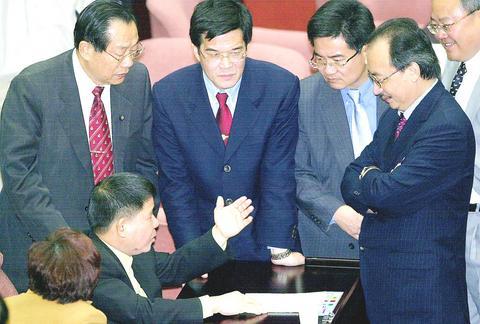Upset with the decision by the Democratic Progressive Party (DPP) caucus to delay deliberation on a bill he favored, Legislator Chu Hsing-yu (朱星羽) yesterday announced his withdrawal from the party.
"I proclaim my withdrawal from the DPP now," Chu said yesterday after Legislative Speaker Wang Jin-pyng (

PHOTO: LO PEI-TEH, TAIPEI TIMES
Chu, the main advocate for the proposed amendments, declared that "this is the saddest day of my 23-year political life. I need to apologize to President Chen Shui-bian (
"But the decision was based upon my conscience," he said.
The proposed revisions had won endorsement from 163 ruling and opposition lawmakers, Chu said. He said the DPP caucus wanted to block it in order to win votes from the nation's 15,000 tax inspectors.
Chu believes the annual reward system for tax inspectors who have caught tax evaders needs to be revised because the inspectors's excessive checks have interfered with people's lives.
But officials from the Ministry of Finance say the reward system has been institutionalized as part of tax officials' stipends. They said deliberation would be needed to any proposed alterations to the system.
Leaders of the DPP caucus upheld the ministry's view and demanded the revisions be delayed.
Chu's announcement was praised by pan-blue lawmakers, but DPP legislative leaders vowed to hold further discussions with Chu.

Taiwan is stepping up plans to create self-sufficient supply chains for combat drones and increase foreign orders from the US to counter China’s numerical superiority, a defense official said on Saturday. Commenting on condition of anonymity, the official said the nation’s armed forces are in agreement with US Admiral Samuel Paparo’s assessment that Taiwan’s military must be prepared to turn the nation’s waters into a “hellscape” for the Chinese People’s Liberation Army (PLA). Paparo, the commander of the US Indo-Pacific Command, reiterated the concept during a Congressional hearing in Washington on Wednesday. He first coined the term in a security conference last

A magnitude 4.3 earthquake struck eastern Taiwan's Hualien County at 8:31am today, according to the Central Weather Administration (CWA). The epicenter of the temblor was located in Hualien County, about 70.3 kilometers south southwest of Hualien County Hall, at a depth of 23.2km, according to the administration. There were no immediate reports of damage resulting from the quake. The earthquake's intensity, which gauges the actual effect of a temblor, was highest in Taitung County, where it measured 3 on Taiwan's 7-tier intensity scale. The quake also measured an intensity of 2 in Hualien and Nantou counties, the CWA said.

The Overseas Community Affairs Council (OCAC) yesterday announced a fundraising campaign to support survivors of the magnitude 7.7 earthquake that struck Myanmar on March 28, with two prayer events scheduled in Taipei and Taichung later this week. “While initial rescue operations have concluded [in Myanmar], many survivors are now facing increasingly difficult living conditions,” OCAC Minister Hsu Chia-ching (徐佳青) told a news conference in Taipei. The fundraising campaign, which runs through May 31, is focused on supporting the reconstruction of damaged overseas compatriot schools, assisting students from Myanmar in Taiwan, and providing essential items, such as drinking water, food and medical supplies,

New Party Deputy Secretary-General You Chih-pin (游智彬) this morning went to the National Immigration Agency (NIA) to “turn himself in” after being notified that he had failed to provide proof of having renounced his Chinese household registration. He was one of more than 10,000 naturalized Taiwanese citizens from China who were informed by the NIA that their Taiwanese citizenship might be revoked if they fail to provide the proof in three months, people familiar with the matter said. You said he has proof that he had renounced his Chinese household registration and demanded the NIA provide proof that he still had Chinese